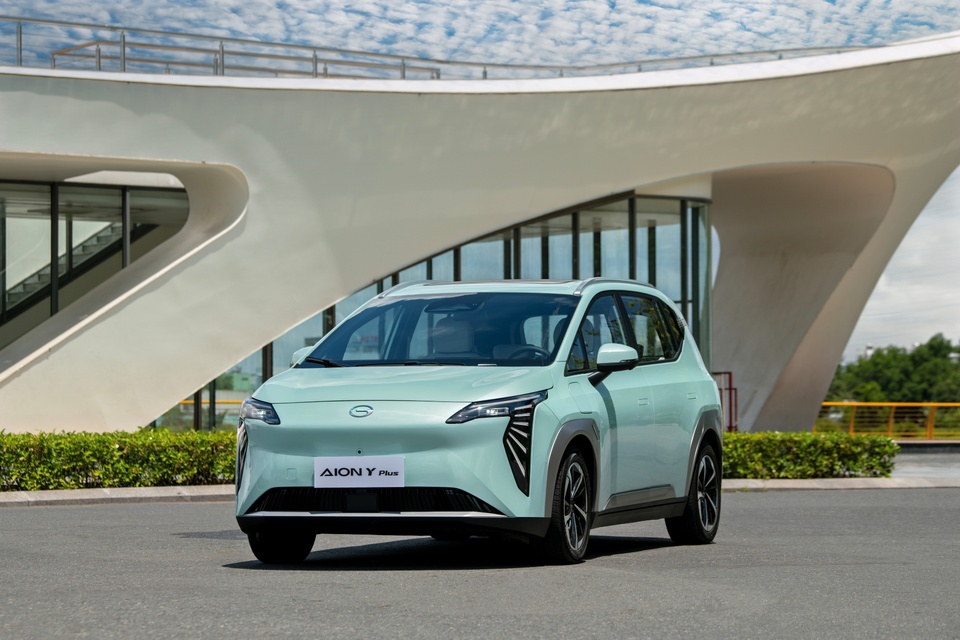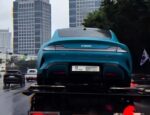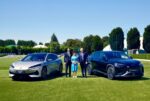
|
The Vietnamese automotive market has witnessed a wave of Chinese automobile brands entering the market over the past year. Kicking off with Lynk & Co, a slew of Chinese automakers including BYD, GAC, Aion, Omoda, Jaecoo, and Geely have successively joined the fray.
While some brands have managed to establish a foothold in Vietnam within a year, others have faced challenges and even quietly exited the market without fanfare.
Quiet Exit
In late March 2025, the former dealership of the electric vehicle brand Aion, under the GAC group, witnessed the opening of a showroom for BYD electric vehicles.
The official fan page of Aion in Vietnam also ceased updating information from that point onwards. When accessing the brand’s official website, the reporter received a notification that the domain had expired.
|
|
|
The former Aion dealership in Ho Chi Minh City has transitioned to selling BYD automobiles. Photo: Phúc Hậu. |
Although there was no official announcement, these actions seemed to implicitly confirm that GAC Aion had officially withdrawn from Vietnam. If calculated from the brand’s official launch in mid-October 2024, the Chinese electric vehicle manufacturer only had about five months of “battle” in the Vietnamese market.
In reality, Aion had spent an entire year before its launch conducting market research and surveys in Vietnam. According to Tri Thức – Znews, the sole Aion dealership in Ho Chi Minh City—which has now ceased operations—was also completed and had vehicles on display long before the brand officially announced its presence in Vietnam.
The quiet exit of GAC Aion exemplifies the challenges faced by Chinese automotive brands, particularly those focusing on electric vehicles, in achieving success in the Vietnamese market.
Chinese Automotive Wave
GAC Aion is just one part of the wave of Chinese automotive brands that have flooded the Vietnamese market in the past year.
Lynk & Co entered the Vietnamese market around the end of 2024 to early 2025 with a range of expensive vehicles, but it was the launch of the B-segment SUV 06 in June 2024, priced at 729 million VND, that truly garnered attention for the brand, which is under the Geely group.
BYD officially entered Vietnam in July 2024, initially introducing three electric vehicle models: the Dolphin, Atto 3, and the sedan BYD Seal. After nearly a year of striving to conquer Vietnamese consumers, BYD’s product portfolio has expanded to include a range of pure electric vehicles such as the BYD M6, BYD Han, BYD Sealion 8, and the lone hybrid model, the BYD Sealion 6.
|
|
|
BYD is one of the notable Chinese automotive brands that launched in Vietnam in 2024. Photo: BYD. |
The GAC brand, under the GAC Motor group, joined the Vietnamese market with its first two models: the GS8 SUV and the GAC M8, a large MPV. At the VMS 2024 event held last year, GAC’s lineup in Vietnam was further bolstered by the introduction of the GAC M6, a mid-sized MPV.
Aion, another brand under the GAC group, focuses on electric vehicles. The brand debuted in Vietnam with the ES sedan and the Y Plus crossover.
The Omoda and Jaecoo brands, under the Chery group, also spent a considerable amount of time surveying the Vietnamese market before officially launching. The Omoda C5 and Jaecoo J7 were the first models introduced, unveiled in November 2024 and January 2025, respectively. The distributor revealed that the Omoda C7 will be the next model to be launched in the domestic market.
|
|
|
Omoda and Jaecoo also spent a significant amount of time surveying the Vietnamese market. Photo: Vĩnh Phúc. |
The Geely brand, under the Geely group, is the newest addition to the Chinese automotive industry’s presence in Vietnam. The B-segment SUV Geely Coolray is the first model to be introduced, with the Geely Monjaro and Geely EX5 expected to launch in the near future.
A few other brands, such as Wey, Tank (under the Great Wall Motors group), and Dongfeng, have also conducted vehicle introductions and test drives in Vietnam. However, as they have not actively promoted themselves, these brands remain relatively unknown to most Vietnamese consumers.
MG and Wuling are also notable Chinese automotive brands in the Vietnamese market.
MG currently holds the record for the longest-standing Chinese automotive brand in Vietnam, having entered the market in 2012. The brand boasts a diverse range of products, including sedans, SUVs, electric vehicles, and even a million-dollar electric roadster launched at VMS 2024 in October last year.
|
|
|
MG and Wuling have a relatively long history in the Vietnamese market. Photo: Vĩnh Phúc, TMT Motors. |
Wuling, distributed by TMT Motors, experienced initial difficulties with its Mini EV urban electric vehicle but has been showing improvements. At the beginning of the year, TMT Motors launched the Bingo, an A-segment SUV/hatchback electric vehicle, and recently revealed plans to soon introduce a range of new electric vehicles across multiple segments.
Unconventional Strategies to Attract and Retain Customers
Entering a market notorious for its preconceptions about Chinese automobiles, brands from the country have had to not only prove themselves through product quality, after-sales service, and competitive pricing but also employ unconventional strategies to attract Vietnamese consumers.
Geely, for instance, recently announced an extended warranty for over 30 critical engine components, increasing the coverage from 36 months to 60 months, while also prolonging the warranty for the engine and transmission.
|
|
|
Geely has extended the warranty for many engine components. Illustration: Phúc Hậu. |
The Omoda and Jaecoo brands, under the Chery group, have also introduced lengthy warranty policies. Vietnamese customers who purchase Omoda and Jaecoo vehicles are offered a warranty of one million kilometers or seven years for the vehicle and ten years for the engine, whichever comes first.
The distributor of Omoda and Jaecoo also garnered attention with their grand vehicle handover ceremonies, where cars were delivered to customers’ homes on truck beds like giant gift boxes, or customers were invited to open “blind bags” at the dealership, containing the car and balloons.
BYD, on the other hand, implemented a free 30-day trial program for its vehicles, applicable to the BYD Dolphin, BYD Atto 3 Dynamic, BYD Atto 3 Premium, BYD Seal Advanced, and BYD Seal Performance models.
|
|
|
BYD offers customers a free 30-day trial of their vehicles. Photo: Phúc Hậu. |
Recently, road trips spanning thousands of kilometers have been organized to demonstrate the range and capabilities of BYD’s hybrid plug-in vehicles, creating a positive impression on Vietnamese consumers. Some of these road trips have even been open to customers, in addition to media and KOL participants.
Overall, the unconventional strategies employed by these Chinese automotive brands have successfully attracted attention in Vietnam. However, to establish a long-term presence and compete on equal footing with Korean, Japanese, and American automakers, Chinese automobiles will need to offer more.
The Future of Chinese Automobiles in Vietnam
Determining the exact reasons why Chinese automobiles struggle to succeed in Vietnam is challenging. However, past prejudices, uncompetitive pricing, and the lack of charging infrastructure (for electric vehicle brands) could be contributing factors.
|
|
|
MG is a Chinese brand that has been present in Vietnam for a considerable time. Photo: Vĩnh Phúc. |
Nonetheless, Chinese automotive brands in Vietnam can take heart from MG’s current success in the market. The brand, under the SAIC group, entered Vietnam in 2012, left, and then returned in 2020 with a new distributor. Today, MG can be considered one of the most successful Chinese automotive brands in the country.
In summary, if Chinese automakers persist with their current strategies, focusing on product quality rather than engaging in price wars or relying solely on gimmicks, there is a chance for success in Vietnam.
The Vietnamese automotive market still holds untapped potential and presents significant opportunities for all participating brands. Any manufacturer that can provide a diverse range of quality products, along with a commitment to long-term presence and after-sales service, has the potential to achieve success.
For Chinese automotive brands, the journey to winning over Vietnamese consumers may be longer than for more established global automakers. Only time will tell what the future holds for Chinese automobiles in Vietnam as we approach the end of 2025.
Books to Read on the Go
The Xe section presents readers with captivating book titles covering a variety of topics. During those moments of rest and relaxation while on the move, books can be a delightful companion.
K5 and Carnival: Can These Models Save Kia’s Slumping Sales Amid the Electric Vehicle Revolution?
Kia is finding an unlikely savior in gas-powered cars, which are keeping the company afloat amid its electric vehicle woes. The South Korean automaker has long struggled to gain traction in the EV market, and these fuel-driven vehicles are proving to be a lifeline, ensuring the company maintains its impressive net profit margins.
“BYD: Powering Inter Milan’s Global Ambitions as Official Automotive Partner.”
BYD – a leading global brand in new energy vehicles (NEVs) – is proud to announce a 3-year strategic partnership with the iconic Italian football club, Inter Milan (FC Internazionale Milano). As their official global automotive partner, BYD is set to showcase its innovative NEV technology to a worldwide audience through this collaboration.
“Lamborghini Reconsiders Pure Electric Car Plans, Prioritizing PHEV Technology”
“The renowned Italian automotive brand, Lamborghini, is poised to embark on a strategic shift in its electrification journey. Amidst a perceived global slowdown in demand for luxury electric vehicles, Lamborghini is boldly re-envisioning its approach, ready to spark a revolution on the road less traveled.”













































